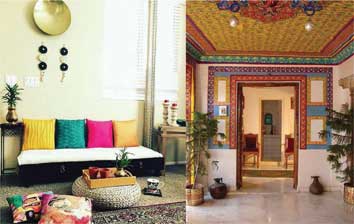Sandhya Kaura
Home is a primary institution and one of the basic building blocks of society. Home is where values are instilled and character is built. Its functioning is impacted by changes in the micro as well as macro environment (political scenario, financial scenario, health, education, work, interpersonal dynamics within family, etc. – even an event as small as the mood of a family member).
A home-scientist is someone who is well-equipped with the knowledge, tools, techniques, strategies in all of the above-mentioned areas and much more to foresee the changes in the demands of the different stakeholders and meet them seamlessly/effectively. Here, an important requirement is that of an emotionally intelligent leader and sutradhar who takes care of herself/himself while facilitating a harmonious soothing joyous atmosphere at home.

Live projects and practical lab
The internet is full of tips, tricks, techniques, hacks and ideas on diet, cooking, fabric care, garment design, interior design, gardening, parenting, financial management, health, interpersonal skills, etc. Students take up the home science course to have an edge in these aspects of life so that they are better equipped to handle future challenges. This is best achieved with practical experience/exposure gained during the course.
Students can be assigned practical weekly or fortnightly projects (depending on the length and intensity of the projects), which can be implemented in their homes or in the living/working spaces of their friends/extended family. These projects can be wide-ranging- indoor/terrace/vegetable gardening, re-organizing or decorating a room with zero or minimal expenditure; designing diets for terminally-ill patients; making curtain tie-backs or placemats, putting in a day of service at an old age home or child-care center, counselling people at NGOs, food preservation, creating innovative healthy recipes, baby-sitting, doing case studies or small-scale research, doing the monthly budgets, evaluating different investment options, etc.
For each of these projects students can be assigned credit points or grades. If the course chooses to give 15 credit points for such projects in a semester, they should be divided such that 5 projects worth 1 credit point each are chosen by the students depending on their personality or areas of interest while 10 other projects worth 1 credit point are assigned by the faculty.
To enhance the value of these projects – a core team of faculty members can design and plan these projects such that they are fun, diverse and have an element of personal creative expression. There also needs to be a measurement framework to evaluate the projects.
Around 30 per cent of the projects can be group projects so that students learn inter-personal skills that are necessary to work with each other, navigate differences of opinions, learn to handle egos, manage different personality types, divide responsibilities, monitor group progress and deliver the final product as a team.
Tangible projects must entail submission of products made, before and after photos etc., and projects that involve soft skills should entail submission of project reports, sharing of experiences through audio and video tools, sharing the challenges and learnings, etc. This will ensure that students do these projects with dedication and are inspired by and learn from each other’s work.

Further, the course can provide a practical lab experience for all the students for about 5 to 7 days – wherein a few of the faculty members stay with the students on campus at the end of every semester and help them practice certain home science skills under their able guidance. In order to ensure that students get a rich practical lab experience – the physical environment of the college needs to be inspiring and nurturing. The college itself needs to be treated like a home on a larger scale.
Sensitivity training and development of emotional intelligence
Sensitivity training and working towards the development of emotional intelligence is important since the home has a wide range of age-groups and inter-personal interactions and emotional relationships.
In a home – different physical, mental, hormonal, emotional challenges are brought along by different milestones in the lifecycle of family members. Examples of such milestones/situations are: marriage, pregnancy, birthing, nursing, parenting, career shifts/challenges, work environment of self and family members, teenage, menopause, old age, etc.
In addition to a lot of group activities and soft skill projects – the college should have a counsellor, who can take sessions on self-awareness of emotions, help with team-building exercises and conduct one-on-one counselling sessions for students.
Focus on child development and psychology
The well-being of children and their optimal physical, mental, emotional development is important. The foundation of a child’s personality is laid in the first seven years, most of which are spent at home. Hence, the emotional and intellectual environment at home has a significant influence on the child.
In many cases, adults believe that children don’t know anything and that they are in a better position to steer a child’s life. Nothing can be farther from the truth.
Yes, children’s bodies and minds develop during childhood and they acquire knowledge of the ways of the world. However, even a new born child can experience the complete range of emotions that adults experience and has the same ego as that of an adult.
This is where a home scientist, who is armed with this knowledge and understanding, can make a huge difference in building a better life for the child.
Aligning body, mind and spirit
Meditation, yoga, physical exercise, playing sports – all have multiple benefits. They keep us healthy, happy, relaxed, stimulate better brain function, increase attention span and enhance productivity.
The course must include all of these and combine them with suitable conceptual sessions to ensure better assimilation.

Sustainable eco-friendly Living
Families can do a lot to prevent the senseless abuse of mother earth by making aware, informed consumption choices. Their choices determine what and how things are being produced. Home-scientists can make a significant difference to the future of our planet by making choices (consume organic food; avoid chemicals by using natural home and personal care products, waste segregation and composting, etc.) that preserve and nurture human health, homes and mother earth.

Budgeting and investments skills
It would be good to also equip home science students with the ability to engage in income-generating activities. They should be encouraged to be entrepreneurial and make home-made, healthy and eco-friendly products and sell them both online and offline.
They can be taught the basics of financial planning, budgeting, manufacturing, marketing, accounting, financing, etc., so that they understand the basic theoretical concepts.
After the conceptual training – they should be encouraged to intern six months in a start-up company to gain some of these skills while working on live projects in these companies.
Continuing education
As a work in progress, it would be beneficial if educational institutions develop a mobile app where webinars, workshops, awareness drives, can be conducted regularly to help the alumni and staff stay abreast of current happenings, trends and practices. Organizing annual or bi-annual virtual meetings of entrepreneurs/working individuals with a moderator can facilitate sharing, assessing, analyzing and learning from each other’s experiences. The faculty members’ work-life balance, training and skill enhancement should also be conducted on similar lines.
Let the title of a “home-scientist” be coveted. One maybe a home-maker, but in order to be called a home-scientist, every five years people should submit a white paper on experiential learning or make a new discovery, innovation or invention in any of the aspects of home science.
The author is a home-scientist, life-coach and entrepreneur who loves to live a fulfilling life. She can be reached at sanramchandani@gmail.com.
